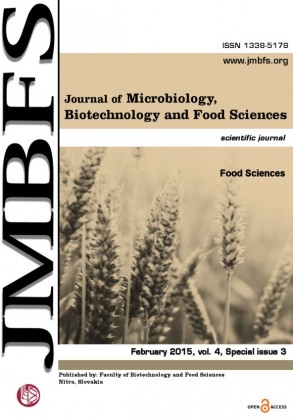HEALTH BENEFITS OF KVASS MANUFACTURED FROM RYE WHOLEMEAL BREAD
DOI:
https://doi.org/10.15414/jmbfs.2015.4.special3.34-39Keywords:
Bread kvass, consumer acceptance, antioxidant activity, chemical compositionAbstract
Kvass based on traditional technology completely disappeared from polish market. It was replaced by drinks, prepared from malt concentrates, wrongly named kvass. The aim of this study was therefore to obtain traditional bread kvass (by fermentation), using the mash prepared from commercial wholemeal rye bread, produced by 5-phase dough fermentation method, and to determine the quality of this kvass in terms of consumer acceptance, chemical composition and antioxidant activity. It has been demonstrated that based on the traditional wholemeal rye bread, it is possible to produce good quality bread kvass, with similar organoleptic qualities to the commercial kvasses, which contain several added flavours and preservatives. Natural bread kvass can be consumed by consumers of all ages, since it contains only trace amounts of alcohol, and it has almost double the dietary fibre content and three times lower content of reducing sugars as compared to the commercial kvasses. Laboratory made kvasses by natural fermentation also showed an increase in antioxidant activity by 60%, when compared to commercial kvasses.Downloads
Download data is not yet available.
Downloads
Published
2015-02-02
How to Cite
GambuÅ›, H., Mickowska, B., BartoÅ„, H., Augustyn, G., Zięć, G., Litwinek, D., Szary-Sworst, K., & Berski, W. (2015). HEALTH BENEFITS OF KVASS MANUFACTURED FROM RYE WHOLEMEAL BREAD. Journal of Microbiology, Biotechnology and Food Sciences, 4(special issue 3 (Food Sciences), 34–39. https://doi.org/10.15414/jmbfs.2015.4.special3.34-39
Issue
Section
Food Sciences
License
Copyright (c) 2015 Halina Gambuś, Barbara Mickowska, Henryk Bartoń, Grażyna Augustyn, Gabriela Zięć, Dorota Litwinek, Katarzyna Szary-Sworst, Wiktor Berski

This work is licensed under a Creative Commons Attribution 4.0 International License.
All papers published in the Journal of Microbiology, Biotechnology and Food Sciences are published under a CC-BY licence (CC-BY 4.0). Published materials can be shared (copy and redistribute the material in any medium or format) and adapted (remix, transform, and build upon the material for any purpose, even commercially) with specifying the author(s).





